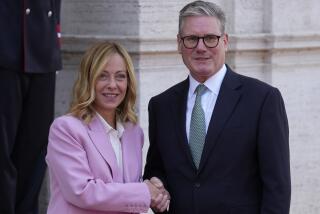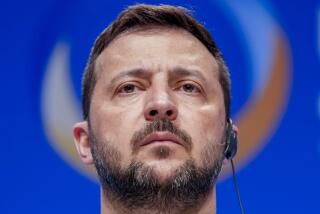Gorbachev, in Rome, Is Equally at Home as Tourist, Diplomat : Diplomacy: The Kremlin leader visits the Colosseum and admires the sunset. He later calls for talks on cutting naval forces in the Mediterranean.
- Share via
ROME — Mikhail S. Gorbachev came, he saw, he conquered. The Soviet president swept past cheering crowds lining flag-decked streets Wednesday at the start of a three-day visit to Italy that will conclude Friday with a historic meeting with Pope John Paul II.
With scant regard for security and the niceties of protocol, Gorbachev stopped on his way into the Colosseum to shake hands with cheering Romans. And he stopped for coffee after watching the sunset from the Piazza del Popolo (expresso, with half a spoon of sugar, Italian television promptly informed its viewers).
“We have begun a very serious dialogue with the Italian government,” Gorbachev said before meeting with Prime Minister Giulio Andreotti. “I’ve had a good tour of Rome,” he told Andreotti with a smile.
At a state banquet Wednesday night, Gorbachev took his government’s longstanding call for a reduction in naval forces a step further, urging negotiations with the United States and its allies to trim their fleets and bases in the Mediterranean.
“The Cold War is ending,” he said in a toast, “not because there are victors and vanquished but because there is neither one nor the other. It is therefore possible to avoid the period of a ‘Cold Peace’ and to move with greater courage toward a time of real peace.”
The North Atlantic Treaty Organization and the Warsaw Pact, he told his hosts, should be transformed into instruments of peaceful cooperation in a Europe, with common ideals.
After talks with government officials and with leaders of the Italian Communist Party today, Gorbachev will deliver what has been described as a major address as a prelude to this weekend’s meeting off Malta with President Bush.
Wednesday’s conversations with the Italians focused on the changes that perestroika , Gorbachev’s program of domestic reform, have triggered in the Soviet Union and Eastern Europe. Agreements signed here--for joint investment in the Soviet Union of more than $3 billion by Italian private and state enterprises--underline Italy’s support for change.
“In the West,” Gorbachev said, “it is often asked, ‘How can we help?’ The greatest help is understanding of our developments and problems. We favor cooperation . . . but we must carry out perestroika ourselves. The riches of the West cannot substitute for what we must do ourselves.”
Whatever the ultimate commercial or diplomatic consequence of the trip, the first day of the first visit to Italy by a leader of the Soviet Communist Party was a public relations success.
“What grandeur,” Gorbachev said, standing with his wife, Raisa, in the Colosseum, where gladiators once fought.
“Splendid palace, fascinating city,” he said as he headed off to lunch with the president (a rice and shrimp dish called risotto Michelangelo; dinner consisted of ravioli with white truffles and rolled filets of fish from Sicily).
Mrs. Gorbachev was as chic as the Italians had expected. She wore a fitted red jacket with black trim to the opening of an exhibition of Soviet art. The finest of Rome’s designer boutiques on Via Condotti were decorated with Italian and Soviet flags and pictures of the Gorbachevs, but the Soviet First Lady did not visit them.
Crowds were smaller than those that turned out for Gorbachev in West Germany and Britain, but by the standards of a city inured to visiting VIPs since the time of the Caesars, Wednesday’s welcome was extraordinary.
“Why such enthusiasm for a politician?” a reporter asked, nonplussed by the crowd at the Colosseum, which greeted the Soviet leader with applause, cries of “Gorby!” and “Bravo!” and a small, hand-lettered sign that said, in Russian, “We Love You.”
“His policy is planetary, surreal, evangelical,” replied a pensioner in a knitted cap and white beard.
Gorbachev’s Soviet-made Zil limousine crisscrossed the historic heart of the Eternal City flanked by Italian carabinieri on motorcycles and plainclothes agents in sleek Alfa Romeos. As expected, nothing else moved in downtown Rome for most of the day.
At one point, as Gorbachev’s car approached the prime minister’s office, a man rushed at it waving what appeared to be a letter. The man was seized and taken into custody. A police spokesman said he was Italian and apparently mentally disturbed.
Among the cheering thousands in the streets, Italian Communists were out in force. Italy’s Communist Party, the largest in the West and the No. 2 political force here, broke with Moscow nearly two decades ago. Now virtually a social democratic organization, the Italian party is debating its future under General Secretary Achille Occhetto, who wants to drop the word Communist from the party name and join in a broad leftist coalition.
Occhetto has the support of a majority in the party, but there is strong opposition from a hard core to his right. Occhetto and those who oppose his modernization plan will meet with Gorbachev this morning.
More to Read
Sign up for Essential California
The most important California stories and recommendations in your inbox every morning.
You may occasionally receive promotional content from the Los Angeles Times.










